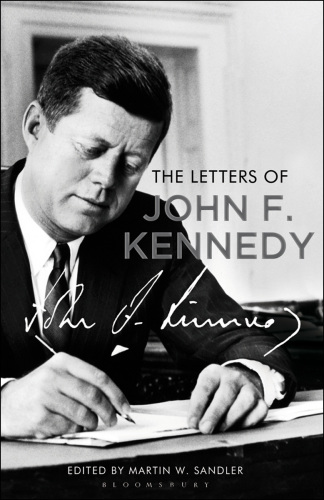
The Letters of John F. Kennedy
کتاب های مرتبط
- اطلاعات
- نقد و بررسی
- دیدگاه کاربران
نقد و بررسی

July 29, 2013
Schooled by Eleanor Roosevelt and questioned by frantic Baptists, the young Catholic senator’s candidacy and fast-paced presidency are documented by a diverse collection of letters, including those from unabashed schoolchildren, leaders such as Martin Luther King Jr. and Billy Graham, world leaders like Winston Churchill, and the Japanese captain who rammed into his PT-109 patrol boat during WWII. Sandler (Kennedy Through the Lens) primarily focuses on the positive, and on correspondence illuminating Kennedy’s positions on controversial matters—sidestepping his extramarital activities but contributing to conspiracy theories—while framing the dialogue with concise, informative descriptions to provide context. While Harry Truman’s plainspoken support still entertains, it’s Kennedy’s replies to numerous school children that reveal both heart and humor even as he deals with civil rights, space missions, nuclear proliferation, and Vietnam. Most substantive are the increasingly relaxed communications between Kennedy and Krushchev until the sudden, tense missives spanning the Cuban Missile Crisis. Sandler humanizes the near-mythical president through his own eloquent words in a way that both academics and casual readers will appreciate. B&w illus.

October 15, 2013
A selection of letters to and from John F. Kennedy written over the course of 35 years. Sandler (Imprisoned: The Betrayal of Japanese Americans During World War II, 2013, etc.) asserts that "one can discover more about Kennedy the man, Kennedy the president, and the extraordinary and harrowing times in which he lived by reading his correspondence than through any number of the scores of books that have been written about him." This volume, however, presents only about 75 letters by Kennedy, many quite short. Sandler fills out the remainder of the book with letters and telegrams to Kennedy from correspondents ranging from Queen Elizabeth and Billy Graham to ordinary American voters and schoolchildren. Most of the letters appear in three sections, introduced in adulatory prose, covering the presidential election of 1960, domestic policies of the administration and foreign crises. These include a tactful exchange with Eleanor Roosevelt, firmly rebutting her assertion that Joseph Kennedy was attempting to buy the presidency for his son; frequent well-deserved hectoring missives from Martin Luther King Jr. and other black leaders urging Kennedy to do more to support their efforts; and secret letters to and from Nikita Khrushchev about the Berlin and Cuban missile crises, when Kennedy was struggling to overcome the Russian's perception that he was a lightweight. A memo to the commander of NATO forces in Europe in which Kennedy lays out the sequence of authorized responses to Soviet provocations over Berlin, up to and including the use of nuclear weapons, is particularly chilling. Most striking to the modern ear is Kennedy's ability to set forth specific and carefully considered policies in crisp, clear sentences, a talent that has been in short supply at the upper levels of American politics for quite some time. Though remarkably comprehensive for its limited length, more of Kennedy's voice would have served Sandler's purpose better.
COPYRIGHT(2013) Kirkus Reviews, ALL RIGHTS RESERVED.

March 1, 2013
So far, this is the only selection of letters to and from Kennedy I've seen as we approach the 50th anniversary of his death. Drawn from more than two million letters on file at the Kennedy Presidential Library, the volume includes correspondence with Eleanor Roosevelt, Martin Luther King Jr., John Wayne, Nikita Khrushchev, Ngo Dinh Diem, and even a young John Kerry--how timely is that? Look for some facsimiles and archival photographs; Sandler is a former U.S. history professor with five Emmys to his name, so he should have an eye for what's striking.
Copyright 2013 Library Journal, LLC Used with permission.

























دیدگاه کاربران